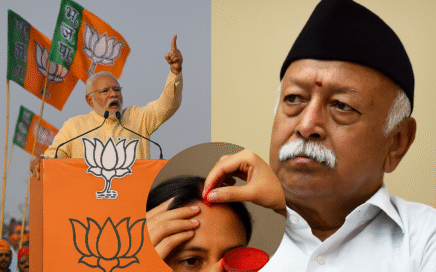
Operation Sindoor, India’s recent military response to the Pahalgam terror attack, has not only stirred nationalistic sentiments but also ignited a series of political and cultural debates. The alleged plan by the Bharatiya Janata Party (BJP) to distribute sindoor (vermilion) to women as part of a celebratory campaign has been at the center of this controversy. While the BJP has dismissed these reports as “fake news,” the issue has exposed underlying tensions between the BJP and its ideological parent, the Rashtriya Swayamsevak Sangh (RSS), and has drawn sharp criticism from opposition parties and the public alike.
RSS and Mohan Bhagwat’s Stance on Operation Sindoor
RSS Chief Mohan Bhagwat publicly endorsed Operation Sindoor, stating that “India seeks peace but has the strength to teach a lesson if provoked.” He emphasized that while India harbors no animosity, it possesses the capability to respond decisively when necessary. Bhagwat’s remarks underscored India’s commitment to global peace while asserting national strength and resilience .
Alleged Differences Between RSS and BJP Over Ceasefire
Despite the RSS’s support for Operation Sindoor, there have been indications of unease regarding the BJP’s handling of the subsequent ceasefire. Reports suggest that while the RSS advocated for a more prolonged and assertive military stance, the BJP’s decision to halt operations raised questions within the Sangh Parivar. This divergence points to potential strategic differences between the two organizations, particularly concerning the duration and objectives of military engagements .
The Controversy Over Sindoor Distribution
The controversy intensified with reports claiming that the BJP planned to distribute sindoor to women nationwide as a symbolic gesture celebrating Operation Sindoor. The BJP swiftly refuted these claims, labeling them as “fake news” and attributing them to misinformation spread by opposition parties . However, the damage had been done, as the reports sparked widespread criticism and ridicule on social media platforms.
Public Backlash and Social Media Outcry
Women across the country took to social media to express their disapproval of the alleged sindoor distribution campaign. Many viewed it as a patronizing and politically motivated move that trivialized a sacred symbol of marital commitment. The backlash was particularly strong in states like Bihar and West Bengal, where sindoor holds deep cultural significance. The public outcry compelled the BJP to distance itself from the reports and reiterate that no such campaign was planned .
Electoral Implications in Bihar and West Bengal
The timing of the controversy is critical, with upcoming elections in Bihar and West Bengal—states known for their significant female voter bases and cultural reverence for sindoor. Political analysts suggest that the BJP’s alleged plan, whether real or perceived, could alienate women voters in these regions. The party’s swift denial of the campaign indicates an awareness of the potential electoral repercussions and a desire to mitigate any negative impact on its voter base.
Mamata Banerjee’s Challenge to Prime Minister Modi
West Bengal Chief Minister Mamata Banerjee seized the opportunity to criticize the BJP and Prime Minister Narendra Modi. She accused the Prime Minister of politicizing Operation Sindoor and challenged him to a public debate on the issue. Banerjee’s remarks further fueled the controversy and highlighted the deepening political rift between the BJP and opposition parties in the lead-up to the elections .
The Operation Sindoor controversy underscores the complex interplay between military actions, cultural symbols, and political strategies in India. While the BJP’s denial of the sindoor distribution campaign aims to quell the backlash, the incident has exposed potential fissures within the party and its ideological allies. As the nation approaches critical elections, the BJP will need to navigate these challenges carefully to maintain its political standing and public support.













